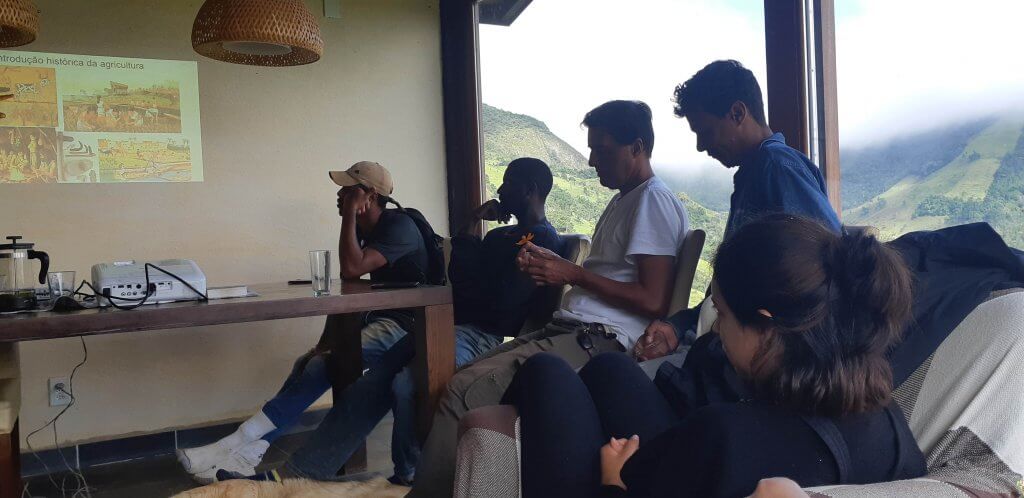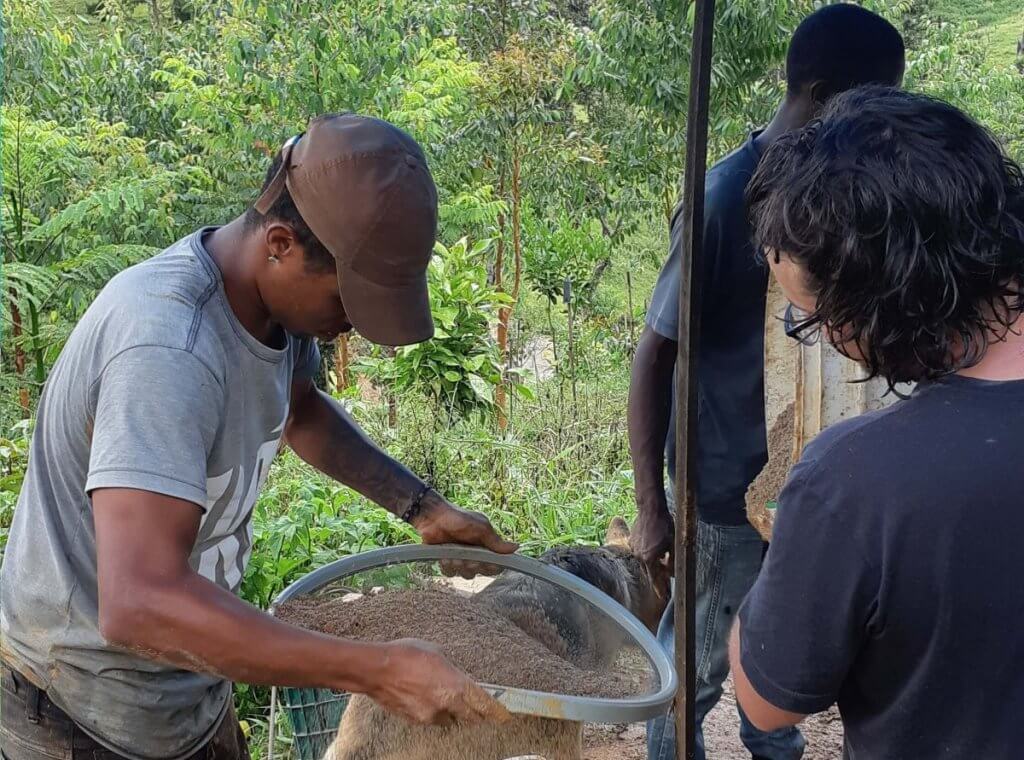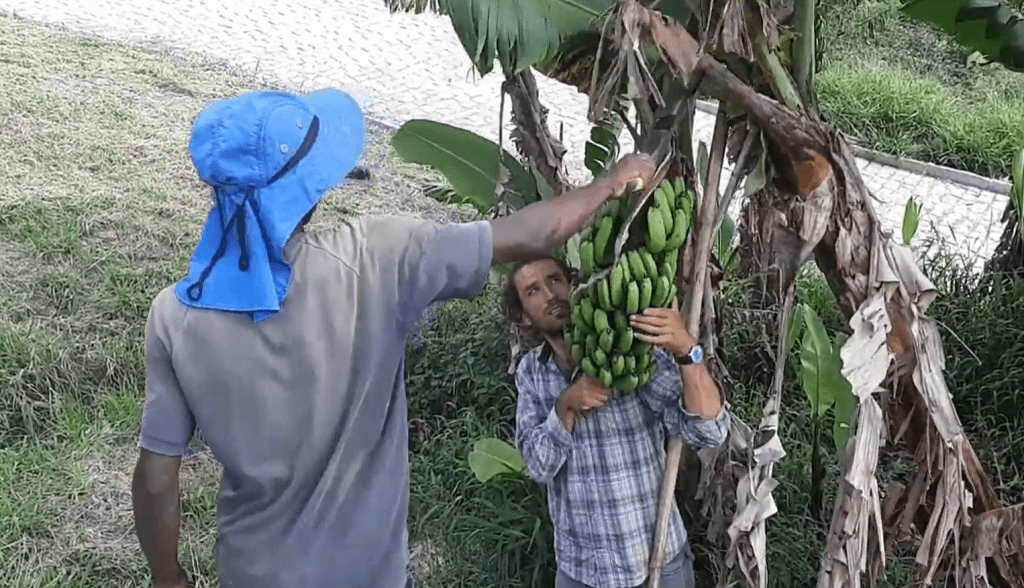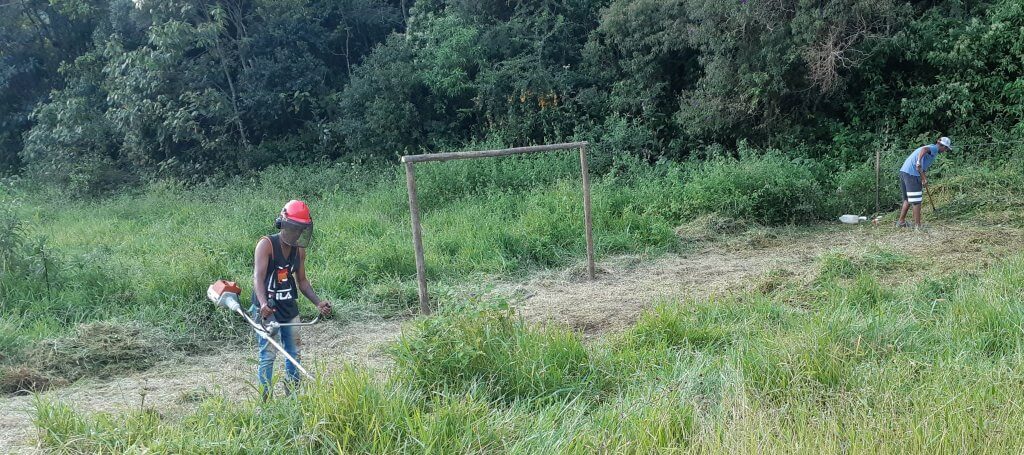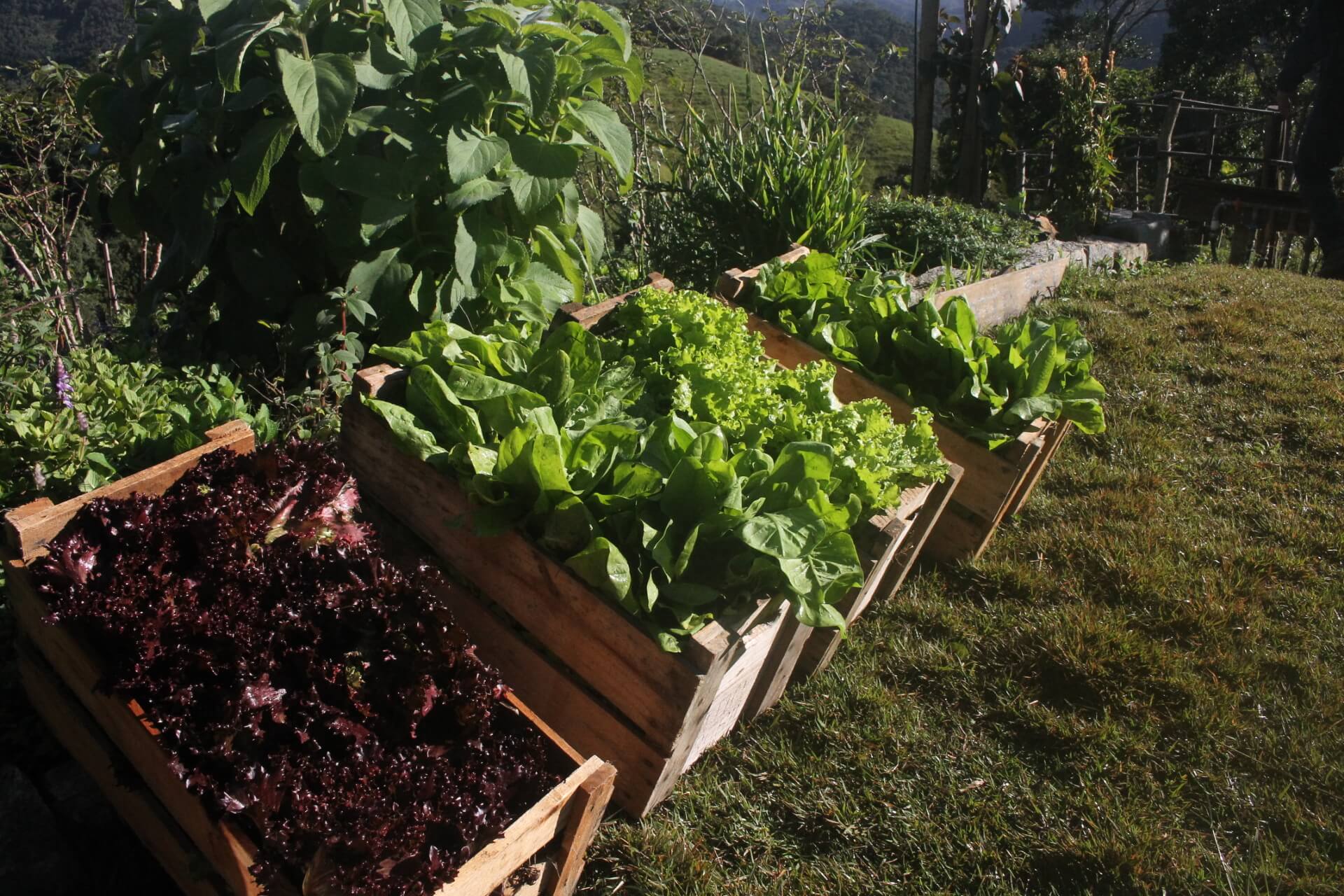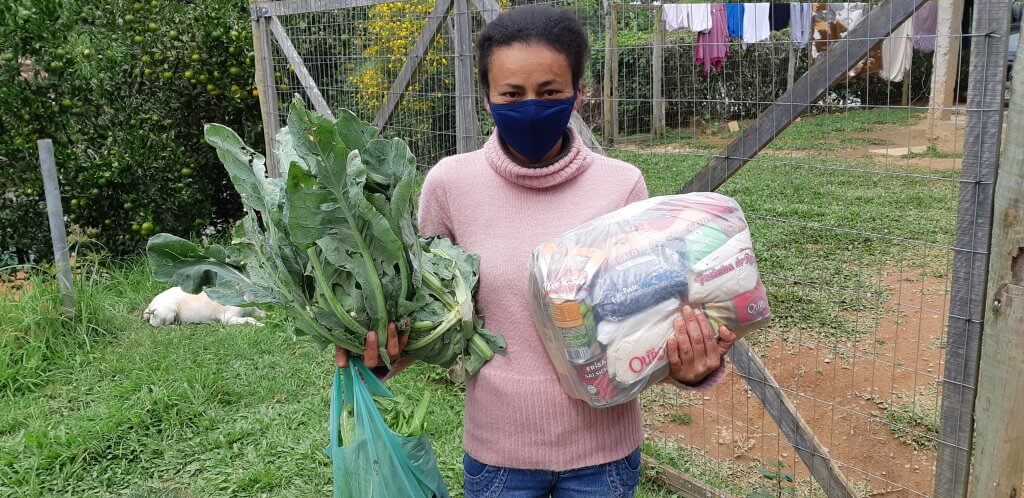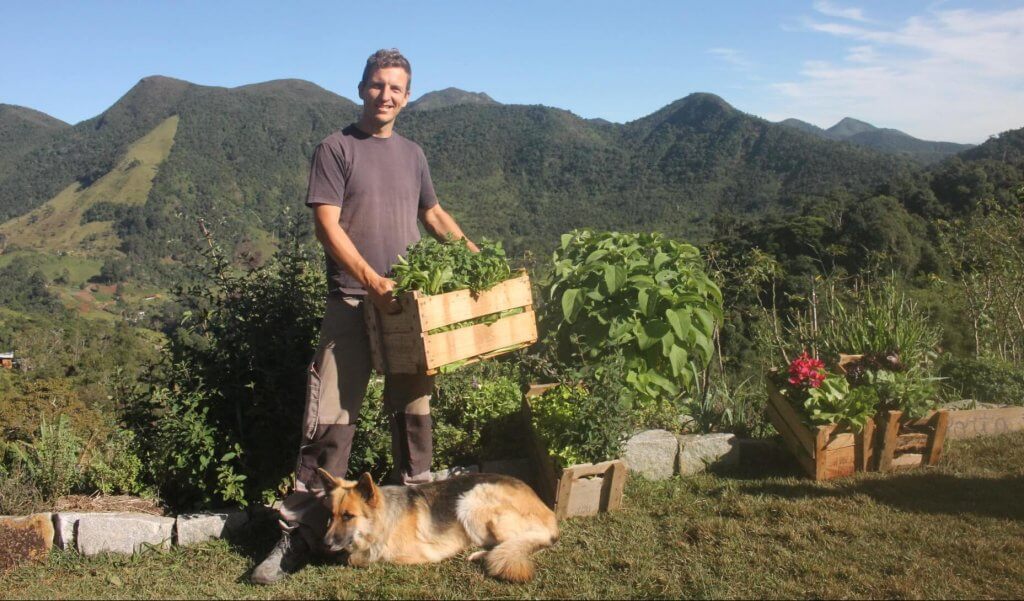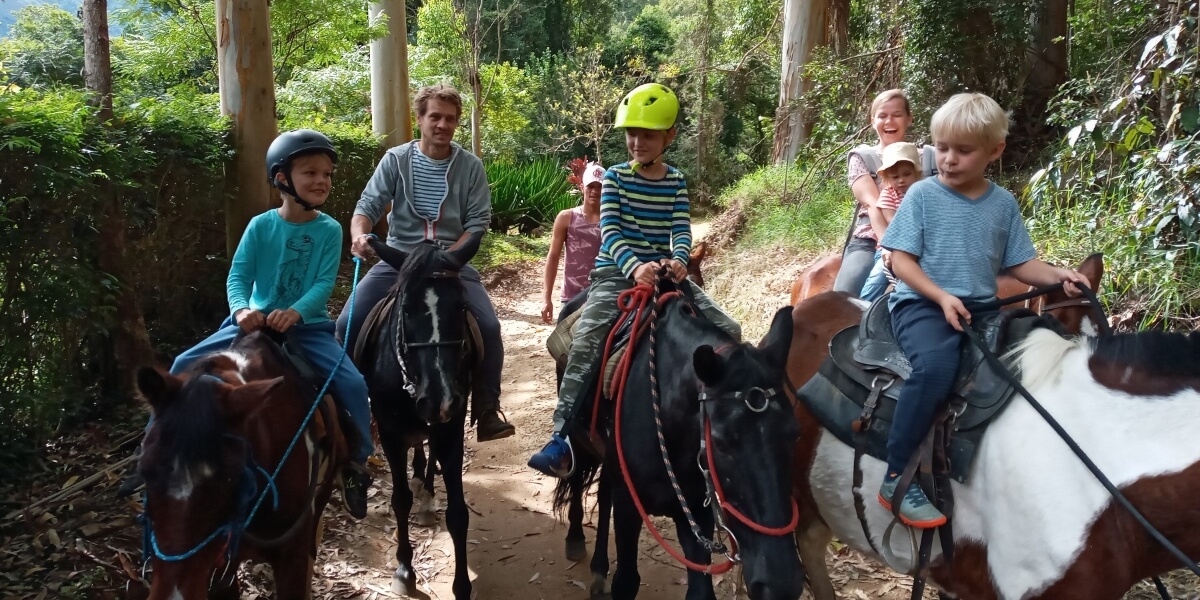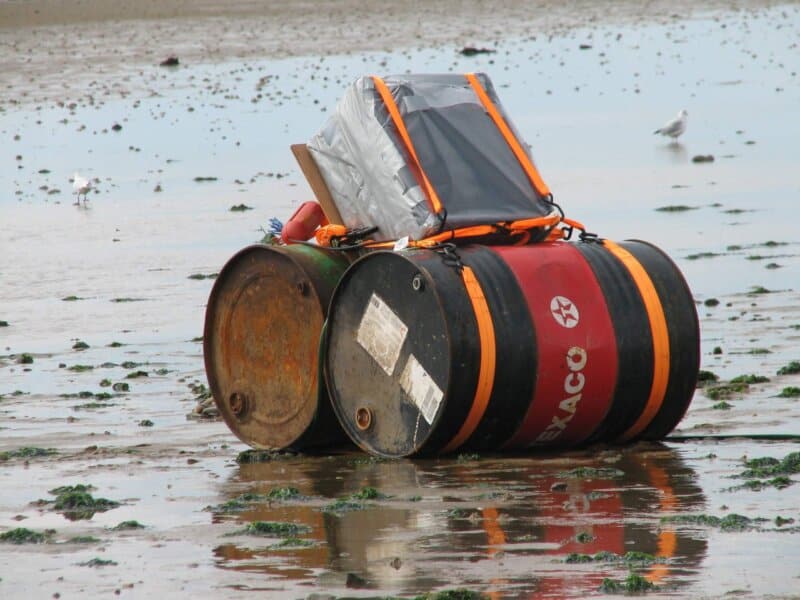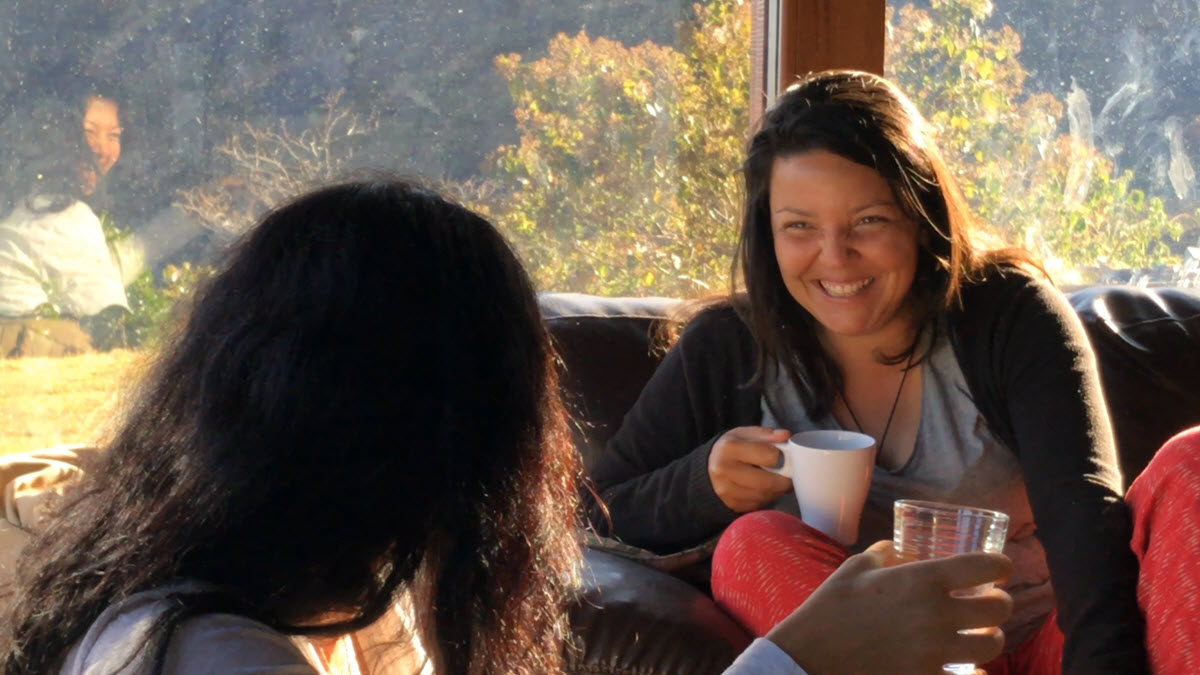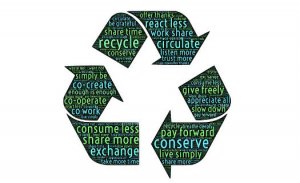Eco Caminhos é uma comunidade intencional no Brasil com o objetivo de tornar-se mais socialmente, culturalmente, economicamente e/ou ecologicamente sustentável. Com o mundo em crise, nós decidimos encontrar uma abordagem diferente para a vida. Nós, a Família Bijen (Hilaine, Bart e nossos filhos Nico e Lucas), compramos uma propriedade perto de Nova Fribrugo no Estado do Rio de Janeiro, Brasil, há cerca de 6 anos. Eu gostaria de compartilhar uma configuração alternativa para comunidades e explicar as minhas razões para fazer essa abordagem.
Nossa experiência vivendo em uma comunidade antes da Eco Caminhos
Minha esposa e eu vivemos em uma comunidade rural em um projeto de orfanato por 6 anos no Brasil. O orfanato era uma associação sem fins lucrativos com uma diretoria. Eu era parte da diretoria. Algumas famílias habitavam na propriedade rural em que recebíamos as crianças. Nós compartilhávamos uma cozinha, uma horta orgânica e tomávamos conta de 20 crianças. Grandes decisões eram tomadas democraticamente, mas nós ainda dependíamos de doações. Então eu decidi começar uma escola de Língua Portuguesa no Rio de Janeiro para gerar receita. Recentemente, a escola tornou-se a maior escola de Português para estrangeiros no Brasil.
As coisas boas/ótimas que vivenciamos na comunidade
- Viver simples e longe do consumo nos deixa mais felizes;
- Ajudar pessoas necessitadas é incrivelmente recompensador;
- Crescimento pessoal pela exposição na comunidade;
- Percebendo que a agricultura orgânica é terapêutica e meditativa para qualquer ser humano;
- Quando nos conectamos, nós alcançamos coisas incríveis que seria impossível de alcançar individualmente;
- Idade não é importante. O que importa é que você se entregue à comunidade.
Desafios que vivenciamos na comunidade
- É realmente difícil conviver com muitas pessoas com diferentes ideias e passados;
- Há pessoas que fazem muito e outras que fazem pouco ou nada e, ainda assim, a tomada de decisões é democrática. Isso pode ser injusto e pode causar tensões;
- Tomar decisões democraticamente é muito devagar;
- Depender de doações é impossível em países como o Brasil;
- Eu senti que a nossa ecovila era separada da comunidade local;
- Nós dependíamos totalmente de doações;
- Todos queriam decidir onde investir e como gastar o dinheiro, mas poucos estavam preparados a arrecadar fundos.
Depois de 6 anos incríveis, nós decidimos sair, pois não fomos capazes de superar a maioria dos desafios. Se você percebesse como é desafiador manter o seu casamento unido e forte, só imagine como fazer isso enquanto vive com várias famílias e seus filhos, cachorros e gatos. Eu percebi que nós simplesmente não estávamos evoluídos o suficiente para lidar com esses desafios. Voltamos para a Holanda para passar o tempo com a minha família e repensar o nosso futuro. Nesse meio tempo, nossos 2 filhos nasceram.
Dois anos depois, nós chegamos à conclusão de que o mundo capitalista não era para nós e decidimos desenvolver uma abordagem diferente para a construção da ecovila – uma que usa o melhor dos dois mundos.
Então, como funciona essa configuração alternativa de ecovila?
Na verdade, não é tão complexo. Pegue uma vila rural comum como exemplo. Todos possuem a sua propriedade e casa com as suas regras e políticas. No nosso plano, a grande diferença é que tentamos colaborar mais, compartilhar da filosofia da permacultura, trocar conhecimento e recursos, crescer e aprender juntos. Estimulamos pessoas com essa visão para entrar na vizinhança. Haverá vizinhos da comunidade local que não vão querer se envolver de forma alguma, enquanto haverá outros que querem estar um pouco envolvidos e ainda alguns que realmente querem participar. E está tudo bem.
Atualmente, nós temos 3 famílias estabelecidas que vieram morar na vizinhança para participar da nossa organização. Nós trabalhamos juntos em troca de conhecimento em permacultura, agrofloresta e bioconstrução. Nós ajudamos uns aos outros, fazemos eventos, passeio a cavalo juntos e até compartilhamos simples piqueniques. Todos podem beneficiar-se do programa de turismo, no qual oferece uma ampla variedade de opções de acomodação, conhecimento e de atividades. O sucesso dessa ecovila vai depender do nível de envolvimento da comunidade – afastando da “sociedade competitiva” para uma “sociedade colaborativa”. Nós temos um bom relacionamento com a comunidade local, pois contratamos pessoas para trabalhar na nossa propriedade, preservamos a natureza, alugamos suas casas e acomodamos turistas em suas casas.
Geração de renda “um tópico sensível mas necessário”
Esse é um tópico sensível se você segue grupos de permacultura e ecovila nas redes sociais. Lá existe esse sentimento de que ecovilas são somente para elites. De algumas formas, essas críticas estão certas. Como um estrangeiro no Brasil, eu sou considerado elite. Ainda assim, as pessoas tendem a esquecer como trabalhamos pesado para chegar aonde estamos hoje na Eco Caminhos. Alguns sugerem que ecovilas deveriam aceitar todos sem nenhum critério. Na minha visão, isso simplesmente não funciona. O mesmo vai para pessoas que dizem que querem viver fora da rede e não querem uma visão capitalista. Você não pode evitar o fato de que temos necessidades básicas e que não somos capazes de voltar a viver na floresta sem nenhum conforto básico e recursos.
Aqui na Eco Caminhos, nós acreditamos que devemos usar o sistema capitalista existente de uma forma mais consciente. Nós geramos receita, mas reinvestimos socialmente, ecologicamente e culturalmente. Para atingir isso, deve haver uma balança entre pessoas que possuem capacidade de gerar renda para a ecovila e pessoas que podem contribuir de forma técnica (permacultura, agrofloresta, bioconstrução), socialmente e culturalmente.
Até então, 30% da nossa receita é gerada pelo ecoturismo, 60% pelos programas de voluntariado pagos e 10% pelos programas de reabilitação. No entanto, esse ano, 30% será gerado por um contrato de projeto de bioconstrução que vamos fazer na região. Nossa renda é reinvestida no melhoramento da infraestrutura, comprando ferramentas, sementes, mudas, energia, comida etc.
Responsabilidade Social
O objetivo principal da Eco Caminhos é oferecer oportunidades de aprendizado para aqueles que precisam e estão motivados a aprender. A Eco Caminhos atualmente investe parte da sua receita e tempo em um programa social para aprendizes (atualmente temos 3). Nós também recebemos um casal de refugiados da Venezuela. Nós oferecemos acomodação, comida, treinamento em agroflorestal e bioconstrução, aulas de inglês, suporte escolar e uma bolsa auxílio.
A equipe que contratamos são pagos acima da média, recebem 8 semanas de férias por ano, comida no trabalho e alguns ainda possuem acomodação. Nós desejamos melhorar essas condições com o tempo.
Claro que não podemos satisfazer todos. Programas voluntários são, especialmente, desafiadores, devido a alta taxa de rotatividade. Esse constante vai e vem de pessoas dificulta para estabelecer uma cultura. No entanto, com a equipe contratada recentemente, nossos programas estão se tornando cada vez mais estáveis.
Nós permitimos que pessoas façam parte da comunidade e da fazenda. As pessoas ficam felizes em ver o seu dinheiro bem investido ecologicamente e socialmente. Isso resulta em turistas satisfeitos, que nos recomendarão para os seus familiares e amigos e ainda darão boas avaliações no Google e TripAdvisor. Isso resulta no aumento de interesse nos nossos programas. Ainda não somos rentáveis. Somente ano passado conseguimos cobrir todos os nossos custos operacionais. Esse ano estava parecendo ser ainda melhor, até o corona vírus aparecer.
As coisas boas / ótimas que vivenciamos na nossa ecovila intencional
- Há zero pressão; a colaboração acontece naturalmente;
- Há um sentimento de independência e zero conflitos nos assuntos domésticos;
- A tomada de decisão é rápida, pois cada família possui autonomia na sua propriedade;
- Mais família estão juntando-se a nós, o que traz um sentimento de confirmação da nossa estratégia comunitária;
- Há mais possibilidades de geração de renda, permitindo que mais membros da comunidade se beneficiem e garantam as suas rendas;
- A comunidade local está se beneficiando da nossa presença. Além de preservar o meio ambiente, nós contratamos trabalhadores locais, atraímos ecoturistas, alugamos cavalos e treinamos os jovens;
- O melhor cenário é uma comunidade ecológica próspera. O pior dos casos é que cada um possui a sua propriedade para viver ou vender;
- Pessoas que querem participar, podem começar como voluntários (programa pago ou não) e vivenciar antes de investir;
Os desafios
- Montar uma ecovila é um incrível desafio, no qual exige determinação e persistência.
- A independência exige que as pessoas gerem a sua própria renda. Para pessoas que possuem poucos recursos ou habilidades empreendedoras, pode ser difícil;
- Ainda não alcançamos um status de ecovila madura. Todas as famílias estão estruturando as suas propriedades. Os verdadeiros desafios para o desenvolvimento da nossa ecovila ainda estão por vir.
Quer entrar na nossa ecovila intencional?
Sim, há propriedades à venda ou para alugar na vizinhança. No entanto, recomendamos que comece por um de nossos programas de turismo ou voluntariado para permitir que você nos conheça e vice-versa. Dace, Robert, Leo e Nora vieram como turistas em 2019 por 4 dias na Eco Caminhos. Eles ficaram interessados em participar da nossa comunidade e voltaram para mais 2 semanas de experiência. Recentemente eles compraram uma propriedade ao lado e estão atualmente estruturando a sua propriedade. A família também quer aplicar agrofloresta e bioconstrução e colaborar no ecoturismo para gerar renda.
Se você deseja vivenciar a nossa ecovila intencional, nos visite! Você pode participar de um de nossos programas turísticos customizados, que podem ser de até 2 semanas. Por um período maior, nós sugerimos os nossos programas de voluntariado que podem ser de 2 semanas até 1 ano. Há programas pagos e gratuitos, depende do tempo que você quer se envolver, suas habilidades e suas necessidades. Uma vez que você sente que deseja entrar, nós adoraríamos ajudar a encontrar um lugar para você comprar ou alugar. Você também pode conhecer a região com todos os prós e contras. Quando você escolher um programa, você pode nos enviar um formulário online. Nós geralmente respondemos em até 3 dias úteis. Se você fizer uma boa proposta, nós agendamos uma entrevista para nos conhecermos melhor e esclarecer algumas expectativas.
Quem sabe… Talvez a gente se conheça em breve!

